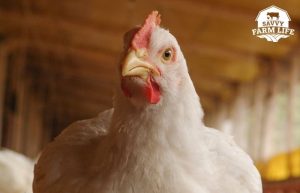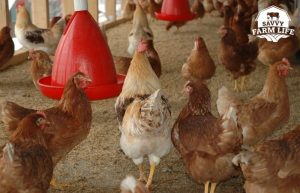
How to Deal With Chickens Pecking Each Other
There is nothing quite as traumatizing as watching a flock of chickens bully another chicken. There have been many times I had chickens picking on another and I didn’t know what to do. Understanding why chickens peck each other can help you take the proper measures to fix the situation.
Why do chickens peck each other? Chickens can peck for several reasons, but the solution will depend on the reasons behind why your chickens may be exhibiting this behavior. Here is a list of reasons why chickens may peck each other:
- sickness
- dominance
- boredom
- overcrowding
Chickens will pick on each other just like humans will when tensions are high for whatever reason. There are a number of things that could cause your chickens to be stressed and to express that stress through pecking others. There will always be a hierarchy or “pecking order” in your flock, but there are ways to prevent flock members from pecking each other to the point of injury. Read on to learn more!
Why Chickens Peck Each Other: Sickness
Sometimes chickens will peck themselves or each other because of an illness. Pecking at themselves indicates an illness either of the feathers or skin or of something under the surface in the area they are pecking. This could be pain in an organ or an injury that feathers are covering.
Generally, this will require the chicken to be examined. If you can catch the chicken, look for sores or irritated areas under their feathers. Often times, the chicken may have missing feathers in irritated areas.
Pecking at others could be because the others are sick and weak and therefore easy targets. Sick or injured chickens struggle to defend themselves from attack, so bored or dominant individuals are likely to take advantage of their weakened state to entertain themselves and try to assert their dominance.
Solution:
Sick animals should be separated from the abusive chickens and allowed to rest and heal without interruption. Give the chicken time to heal. If they are not progressing, an exam by a vet proficient in working with poultry should be sought if at all possible. A vet has your and your animals’ best interests in mind.
Since other factors are likely involved, read on for additional actions you can take to prevent harmful pecking.
Why Chickens Peck Each Other: Dominance
Chickens will peck at each other to establish the pecking order or hierarchy within the flock. This is a normal behavior and doesn’t usually result in injury. It can occur with more frequency if the flock is moved to a new location, new members are added to the flock, or the flock is separated into smaller flocks for housing in different areas. Anything that is a change in the environment, particularly in which chickens are present, can result in a reestablishing of the pecking order.
While this is usually a generally harmless process, sometimes problems can arise. A particularly dominant individual may cause harm with much more pecking than necessary. This will be obvious if one chicken has beautiful, healthy plumage while several others have had their rump feathers picked at or pulled out.
In some cases, there may be a particularly weak bird who many other chickens enjoy pecking at because it’s easy and something to do when they’re bored.
Did you know that you can keep Guinea Fowl with chickens? Learn how to integrate your flocks by visiting my article Can You Keep Guinea Fowl With Chickens? (Read Before Trying.)
Solution:
If there are one or two chickens in particular who are picking on the others, you may need to remove them from the flock. They can be placed with a separate flock, or given to a friend to see if they will fit in better in their flock. Or, if you raise chickens for meat, simply cull these individuals next. They likely have a larger body and therefore more meat than many of the others.
If there are a couple of weaker individuals being picked on by all the others, the same solutions apply.
However, because this problem could be associated with other causes of pecking among flock members, you may want to consider whether expanding the pen or decreasing boredom could help distract the pushier individuals from the weaker ones before trying anything more drastic.
Why Chickens Peck Each Other: Boredom
It is natural for chickens to spend the majority of their time scratching and pecking at the ground for food items. This is a normal behavior and what would usually take up most of their waking hours in the wild. But in captivity, when they are fed once a day in one place and have nothing to do the rest of the day, they get bored. When the ground isn’t suitable for expressing that behavior they feel naturally driven to perform, they get frustrated. Boredom and frustration come out in unfortunate ways.
Chickens who are bored and frustrated at their inability to perform that natural behavior in a satisfying way may take to catching at and pecking other flock members. Chickens will eat anything, including each other. And out of boredom and desperation, cannibalism may occur. This difficulty is exacerbated by overcrowding, inappropriate temperatures, and inadequate amounts of food.
Solution:
 Keep the chickens from getting bored. Move their coop to a new location from time to time so that the ground they have thoroughly ravaged can be replaced with new ground, potentially with grass and bugs and all kinds of interesting things to investigate.
Keep the chickens from getting bored. Move their coop to a new location from time to time so that the ground they have thoroughly ravaged can be replaced with new ground, potentially with grass and bugs and all kinds of interesting things to investigate.
Try spreading their food out all over the ground, rather than dumping it into a couple of feeding stations. Not only does this make it easier for everyone to eat without intimidation or argument from more dominant animals, but it also makes the eating take longer. Just like it would in the wild. Anytime you can make food available in a foraging way rather than tossing it in a bowl, foraging is preferable.
Throw in extra treats unexpectedly. Instead of giving a few mealworms every morning, throw in a big handful every few days so that it’s not predictable and, therefore, is more interesting. Put the compost pile in different parts of their coop or scatter it all over the floor rather than throwing it in the same corner every time. Anything you can do to make it interesting and add variety is great.
Additional things you can do to make it more interesting would be to put some treats in a cat treat ball that must be kicked around for a while to get a treat to fall through a hole. This can provide hours of entertainment to most kinds of animals. Placing fallen logs in the enclosure or other bits of nature that can be investigated and pecked will also help with this.
Why Chickens Peck Each Other: Overcrowding
It is important to provide enough room for all of your chickens. As your flock grows, you may need to add additional space to accommodate a larger number of animals. This could mean adding more food stations at least, and potentially also extending pens and adding more roosting areas.
Perhaps the most important part is ensuring that there is enough room for all chickens to eat at the same time. If there is not, then larger, more dominant birds may prevent other flock members from eating. If this happens regularly, the birds who don’t get to eat will weaken and eventually starve. Birds in this condition may become subjects of pecking and even cannibalism in an overcrowded chicken coop.
Lack of space, in general, can bring out the worst in anyone, even humans. And chickens are no better. Altercations break out more frequently among many animals in a small space, and sudden movements in crowded areas can cause injuries, such as wings spread and flapped in outrage getting snagged on a piece of fencing or a nail that’s been pushed out of the wood a bit over time.
Chickens can be quite brutal to others with injuries, and even if they are strong enough to stand up for themselves, once blood has made an appearance, the other chickens will likely peck the bleeding chicken to death out of curiosity or frustration.
Overcrowding also means more fecal matter in less space, which may raise the likelihood of sicknesses due to filthy conditions. This will start a whole other cycle of chickens becoming ill and being pecked to death by healthier flock members.
Solution:
Be sure to provide plenty of room for your chickens as well as plenty of space around the feeding stations. And if you are working with limited space, take extra care to keep the enclosure clean so that animals aren’t exposed to an exorbitant amount of fecal matter.
Make the pen bigger by expanding the walls or building a completely new pen. Alternatively, you could build another separate pen of equal or smaller size and just move some animals into it. That way you could have two locations to move dominant or weak animals to and from to see if they will fit in better in one place or another.
Add more feeding stations, and/or spread food all over the floor as described above. Consider adding additional watering stations as well.
Add more places for roosting. Ensure that everyone has a warm, dry place to sleep in the coop at the end of the day.
A coop is essential to your chickens’ well-being. They will go in a coop to roost for the night and to escape the elements and extreme temperatures. To learn more, visit Do Chickens Get Cold? Essential Guide.
